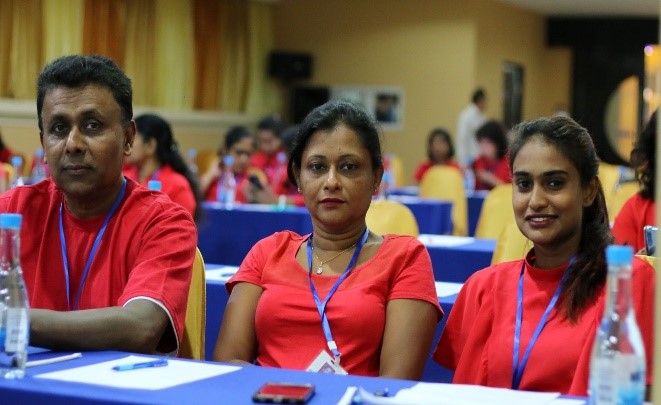
Good leadership is characterized by the ability to manage yourself, your executive, and your peers, explains Sunethra Jayaratne Nugawela
Leadership is a multifaceted skillset that includes flexibility, adaptability, and positivity. Proficiency in managing yourself, your executives, and your peers is the key to successful leadership.
Leaders play a pivotal role in ensuring smooth operations in an organization. They motivate, influence, contribute to developing the organizational structure, arrive at decisions, and ensure accuracy by advocacy. They manage communication downwards, upwards, and horizontally. In literature, managing executives is referred to as “managing up” and managing peers is referred to as “managing across.”
A Symbiotic Relationship
Knowing your executive is the first step to a win-win situation. Establish a cordial relationship based on communication. Observe your executive’s desired methods of receiving and disseminating information and tailor your responses for written communication or dialogue.
Briefing your executive about the progress of your work and any significant activities is a step towards avoiding surprises.
Raising concerns is good, but offering potential solutions and considering matters from your executive’s point of view is better. Giving honest feedback can be challenging, especially if your executive uses negative tactics such as criticizing or judging. Remain composed in such situations, ask thoughtful questions, and try to understand their perspective. This can defuse difficult conversations and will help you grow. Refrain from expressing negative sentiments about anyone. Silence is golden to safeguard your professional image.
Demonstrate a strong work ethic and eagerness to exceed expectations. Seek new responsibilities which will be valued by management. Engaging in professional development and periodic pieces of training will develop your knowledge and skills. Impart your knowledge back to the organization whenever and wherever possible. Every day is an opportunity for learning and growth, for everyone.

Photo credit: Academy for Administrative Professionals Sri Lanka
Managing and Working with Peers
Collaborating with peers efficiently cultivates your power and influence. It tests your abilities and fosters trust, confidence, and cooperation.
Assess your strengths and weaknesses to enhance healthier and productive professional relationships. Welcome feedback from colleagues and take up self-driven learning via professional courses or new and challenging assignments to acquire and hone essential skills.
Managing across peers requires a different approach compared to managing up. Having clear and beneficial goals, credibility, persuasion skills, and emotional intelligence, together with self-awareness, self-regulation, motivation, empathy, and social skills will help you establish mutual success.
Skills Required to Deal with Executives and Peers
Conflicts and disagreements are part of working with people who have different and varied viewpoints. Be open to respecting different perspectives. Deal with disagreements constructively using your negotiation skills. Failure to manage conflicts escalates problems. Active listening is a valuable skill for a leader in conflict resolution.
Workplace disagreements are common and must be managed properly, but they can also be a catalyst for productive gains and solutions. Focus on the matter at hand rather than on the personalities involved. Treat everyone with respect, even those with whom you may have opposing views, and foster a sense of mutual respect. This can ultimately lead to greater trustworthiness and success.
Dealing with rivalry
A strong leader turns rivals into collaborators. Redirection is the key to reversing a rivalry and taking control of the situation. Redirect the rival’s negative emotions away from you with confidence, and use reciprocity to form a successful alliance, demonstrating the benefits before you expect them from others. Encourage others to view things from a logical perspective, taking into consideration the expectations and rewards of the partnership. For good collaboration, recognize the unique strengths and limitations of both yourself and your team members. Build on each other’s strengths to work together. Mutual trust and respect create a positive and productive impact.
Dealing with office politics
Every organization faces office politics. To navigate such situations, actively engage with others regardless of your personal feelings. Remember that different units within a team are interdependent. All team members need to understand the goal and contribute to achieve the common goal. It is also important to understand what information is confidential and what is not.
Building your network
Prioritize building networks and relationships to address the challenges, bringing together everyone’s expertise. Connecting and collaborating as inter-organizational or departmental teams can be mutually beneficial. Identify the benefits of your interactions and categorize your relationships based on factors such as influence, personal development, personal support, energy, a sense of purpose or worth, and work-life balance. Include people with diverse backgrounds in your network. Surround yourself with positive people who bring out the best in you.

Photo credit: Academy for Administrative Professionals Sri Lanka
Growing your personal brand
Take initiative and explore opportunities to contribute to problem-solving. Change can be driven by anyone, regardless of expertise or involvement in an issue. Initiate projects and join a task force to gain visibility as a strong relationship builder. Your credibility is not limited to your conduct in the presence of your executive but also encompasses your actions and demeanor when they are absent. Your personal brand is shaped by your behavior, even in the absence of observers.
Cultivate your personal brand as a kind-hearted leader, resolute staff member, and enthusiastic colleague. A leader is a learner and a follower. Leadership is measured by results, not attributes. Leave a legacy as a leader.
Life is like riding a bicycle. To keep your balance, you must keep moving.
Albert Einstein












